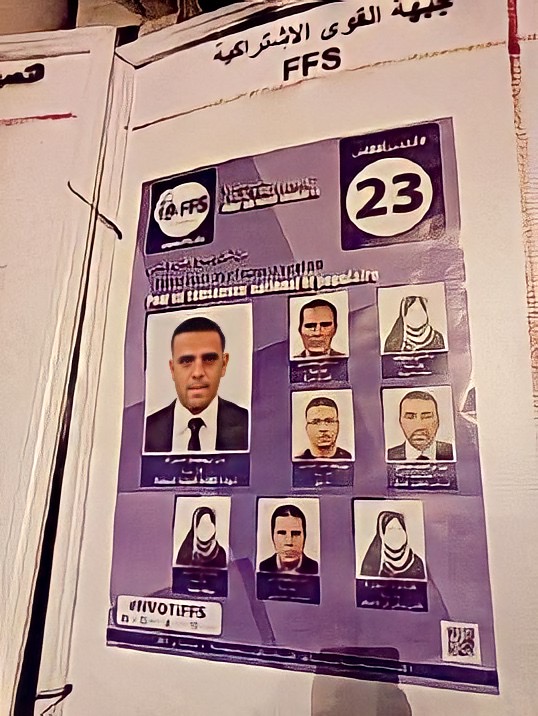This post is also available in: Français (French) العربية (Arabic)
Gone are the days when veiled Algerian women were compared to “covered Peugeot 404” or “trash bags”. The veil is no longer synonymous with austere clothes covering feminine forms in black fabrics. Only a few continue to wear burqas and black gloves. Banned in 2018 in the workplace, the full-face veil has never been appreciated by Algerian women who prefer a “lighter” hijab.
In Algeria, Islamic dress has taken great liberties in public space. For young women in Western attire, it sometimes limits itself to a scarf on the hair. Slim pants and sneakers, false eyelashes and nail polish are among the panoply of seduction we see in almost every city in the world.
Algerian women no longer want to look like “ghosts” or display their femininity without complex. This snub to the rigorous Islamic veil does not appeal to all, but the hostile voices are not strong enough to cover those of the influencers and TV stars of the Middle East.
Hijabistas, a neologism for fashionistas who wear the hijab, now dictate fashion trends. In Algeria, the many veiled bloggers are followed by thousands of subscribers.

Sharing beauty tutorials and tips to seduce, they also give the hijab all kinds of styles, from the most classic to the sexiest. Major brands and a few international haute couture designers have allowed the veil to share the fashion catwalks. The insults and threats they face remind these young bloggers every day that breaking out of the mould of the veiled, silent and self-effacing woman is not without risks. Like all other women, they are aware that wearing the veil - even the most sober - does not protect them against violence and gender-based attacks. So they might as well liberate their perceived femininity and take care of their looks.
Women themselves joke about this diversion of the veil in sexy outfits with the expression “dressed in “Rotana” style on top, “Iqraa” on bottom.”
“Rotana” is an Arab entertainment company and TV channel whose sexy, heavily made-up animators inspire many young women, while “Iqraa” is a television channel dedicated to the Koran and Islamic content.
Imported beauty accessories are found in all markets and an increasing number of shops in Algeria. Turkish or local online sales sites have specialized in fine lingerie. In the 1980s, the informal market held by the trabendists (sellers of illegally imported products) began importing women’s underwear sourced from France, Italy and Spain, quickly supplanted by Turkish, Egyptian, Syrian and even Indonesian and Thai suppliers.

The difficult access to visas and the security situation in the Middle East led many of those businesses to Dubai and then Istanbul. Bazaars called “Dubai markets” flourished all across the country. More affordable Turkish products have gradually supplanted other offers. Then came Chinese products which changed the whole beauty market scene. Products are now available at low prices and in large quantities.
French and European lingerie are reserved for women with high purchasing power in the shops of the wealthy neighborhoods. The “under the veil” sector therefore seems to be doing very well. Paradoxically, this profusion of G-strings, lace and strass bras are displayed everywhere in a conservative country that is very picky about the prudishness of women.
Nonetheless, coquetry and sexy outfits are tolerated, and even recommended, only behind the closed doors of the matrimonial home because women can and must please their legitimate husband and him alone, and use all their charms to prevent him from falling for another woman. This is the hypocritical explanation usually given by those who profit in one way or another from the lingerie trade.
In the beginning, the “sexy" market was in the hands of the “Brotherhood”, in other words men who surfed the Islamist wave selling alluring underwear, while playing religious chants in the background.
The current difficult economic context has promoted Turkish lingerie at the top of the range. “My sister, this is Turkish not Chinese,” will tell you the panty merchant.
All patriarchal attempts to erase women’s connections with their bodies are again reduced to nothing. This constant war against the female body was strongly revealed during electoral campaigns in recent years.
In the 2017 and the 2021 legislative elections, political parties, including those claiming to be from the democratic camp (Front of Socialist Forces and the ANR National Republican Alliance), presented their female candidates with blurred faces on their posters.
A tour in the streets of Algiers will demonstrate that veiled or not, women have no intention of being turned into ghosts. They intend well to impose their “destabilizing” femininity in the eyes of all. "And the devil shall wait."
































